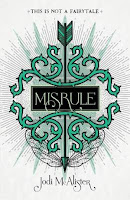Jodi McAlister, using her Valentine series as a springboard,
poses an essential question about fantasy writing: ‘What’s it about?” Read on
and discover the importance of a central theme and purpose and how these
are pivotal to each title in the series.
At the beginning of every semester, I go around my uni classroom
and ask my students what they like to write, and what they like to read. Almost
every time, more than half the class will reply “fantasy”.
This has been both wonderful and challenging for me. It’s wonderful, because I’m an author of a young adult fantasy series (the Valentine series, published by Penguin Teen Australia), and so this makes me well positioned to teach them what they want to learn. But it’s also challenging, because it makes me interrogate my own love of fantasy: what is it about fantasy that’s so appealing?
The answer, on the surface, is obvious: it’s magic. The generally accepted definition of fantasy is that it includes an element of the impossible, something that could not exist in our world (as opposed to science fiction, which is a vision of a future which is possible but has not yet come about). That impossibility at the heart of fantasy is one of the things that draws us in, and thinking about how the impossible elements of the story operate is key to worldbuilding. If you could take the impossible parts of your story out and it wouldn’t have much effect, I frequently tell my students, then it’s probably not fantasy.
That said, if we focus on the impossible – on the magic – of fantasy too hard, we miss one of the most important things about it. Indeed, this is true of any kind of story: if we focus too hard on the mechanics, then we can lose sight of something truly central. All stories – fantasy or otherwise – have to be about something.
 I thought about this a lot when I was writing my Valentine series. Beneath the trappings
of fantasy (which in this case, are tied to some very scary, very powerful, and
very murdery fairies), I wanted to be sure that there was a central thematic
concern running through all three of the books. What I ultimately decided to
focus on were emotions and attitudes that teenage girls are generally
societally discouraged from feeling and/or expressing, but which I think are
hugely powerful and important and which I wanted to embody not just in my teen
girl heroine Pearl but in the people around her.
I thought about this a lot when I was writing my Valentine series. Beneath the trappings
of fantasy (which in this case, are tied to some very scary, very powerful, and
very murdery fairies), I wanted to be sure that there was a central thematic
concern running through all three of the books. What I ultimately decided to
focus on were emotions and attitudes that teenage girls are generally
societally discouraged from feeling and/or expressing, but which I think are
hugely powerful and important and which I wanted to embody not just in my teen
girl heroine Pearl but in the people around her. Valentine, the first book, is about desire: not just sexual and romantic desire, but that specific adolescent frustrated yearning for things you can’t quite name.
Ironheart is about rage. Girls are generally socialised to be nice and smooth things over, to not make a scene, but under that is an incredible wellspring of anger I wanted to express.
And Misrule is about ambition. If the recent heroism of teen girls like Emma Gonzalez and Greta Thunberg has shown us anything, it’s that teen girls have great capacity for leadership, even when people are trying to shut them up, and that’s something I think is incredibly potent.
This is a provocation I’d throw out to all aspiring fantasy authors – and, indeed, all aspiring authors in general. Setting aside the mechanics of how your story works: what is it about?
Twitter: @JodiMcA
Instagram: @jodimcalister
Editor’s note: Get the inside story from one of our bloggers who reviews Valentine and takes a look at the series: If this post has piqued your interest, discover more about Jodie and her writing in this interview.



The interplay between message and medium in the fantasy genre is a stimulating writers challenge. Jodi's focus on exploring the courage and heroism of teenage girls in her Valentine series seems to make the impossible possible and encourage readers to perhaps make this fantasy a reality in their lives.
ReplyDelete